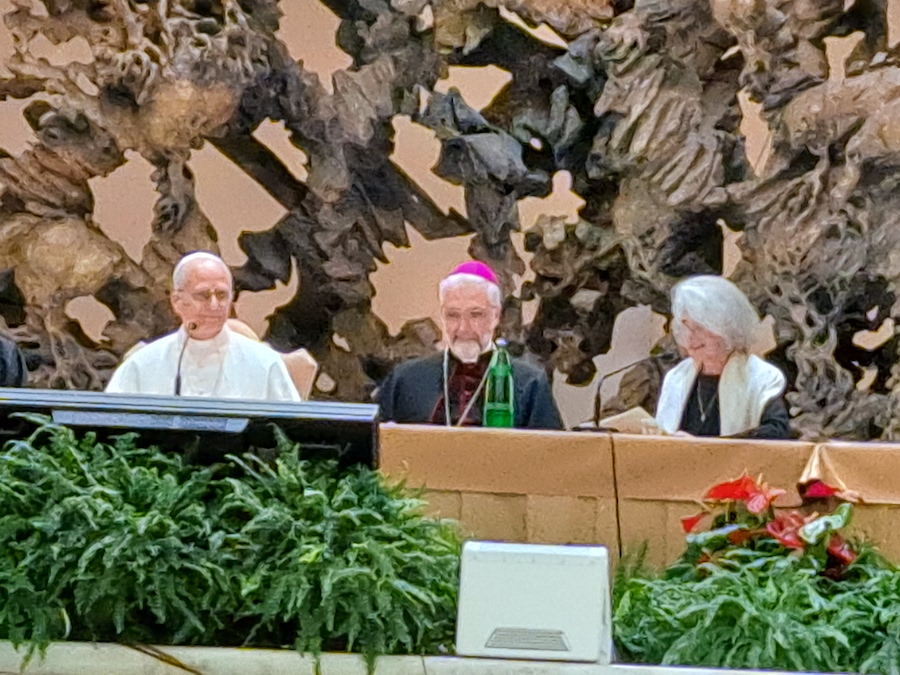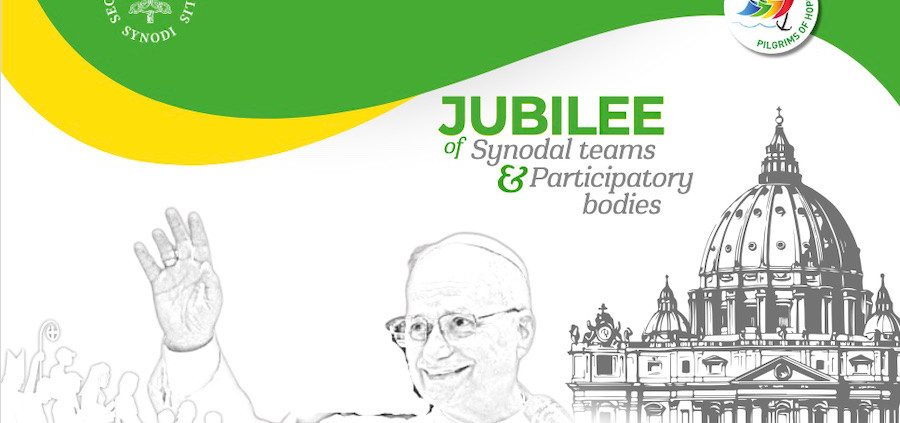A Pilgrim’s Adventure: Rome and Synodality, Day 3 by Patricia E. Clement, D.Min.
Friday was the official opening day of the Jubilee of Synodal Teams and Participatory Bodies being held in Rome. There were many activities, but a particular highlight was an event called the “Encounter-Dialogue” with Pope Leo XIV.
A representative from each of the Synod’s seven geographical regions gave a short progress report on how synodality is being implemented in their region. At the end of each report, the representative presented the Holy Father with a question.
A representative from Africa opened by saying that synodality is shifting from conception to enculturation throughout the region. It is now included in all church-related curricula, from seminaries to parishes and children’s faith formation.
The church in Africa does not consider synodality a campaign with a deadline, but rather a way of being church. The gift that the people of Africa can share with the global church is a deep sense of family, the representative said.
The representative asked Pope Leo about his top priority for synodality. Leo identified this as mission and said that we are called to be witnesses of the gospel to the ends of the earth.
The representative from Oceania said that formation in synodality as the region’s top priority. Synodality is seen not as a technique but a conversion of hearts. Introducing conversations in the Spirit is the region’s second priority, followed by a renewed focus on mission and evangelization. The biggest challenge is finding ways to balance unity with diversity.
The representative from Oceania asked the Holy Father whether the continental groupings of regional churches will continue.
Pope Leo answered in the affirmative. He said that the church has a voice and needs to be courageous and use that voice to transform the world.
The North American region consists of the US and Canadian churches. The dominant issue there is the need for synodal formation at every level, the representative said. The Canadian church has formed a national ad hoc committee for synodality, though progress is only beginning. Few dioceses have welcomed synodality in the United States.
The North American representative said that concerns around cultural diversity, poverty, and migrants represent both a challenge and an opportunity for the church. The Latin American and Caribbean Episcopal Council (CELAM) could be very helpful by sharing their successes in these areas.
The North American representative asked the Holy Father how the church should address the concern of some priests that synodality will diminish their authority.
The pope responded by saying that pace and scale are very important, and that every region does not have to move at the same speed. He also said that it was a disappointment that two countries who have traditionally been close allies are now facing difficulties and division.
Leo continued by saying that we all need to prayerfully reflect on synodality and invite our priests to participate. Formation at every level is the topmost priority, and resistance to synodality is often due to lack of understanding.

Pope Leo XIV, Bishop Luis Marin de San Martin, and Sr. Nathalie Becquart at the “Encounter-Dialogue” for the Jubilee of Synodal Teams and Participatory Bodies in Rome, October 24, 2025. Photo by Patricia E. Clement
The report from the Middle East highlighted how the Final Document of the Synod has been translated into Arabic, alongside the creation of an Arabic-language course on synodality. Regional gatherings of the various churches and patriarchies have been fruitful. Synodality is now a part of seminarians’ formation.
The question from the Middle East to the Holy Father pertained to what aspects of synodality he considers most urgent for the region.
Pope Leo said that the sign of hope that the Middle Easten Christians give to the rest of the church is their unwavering enthusiasm in their faith. The West needs to better understand the challenges of the Middle East, he added. If we don’t first respect one another and dialogue, we will never come to know one another.
Like Oceania, the report from South America stressed synodal formation as the main priority. To this end, CELAM has overseen the printing and distribution of formation materials and the translation of the Final Document into simple pastoral language.
CELAM has also formed national implementation teams and is in the process of creating a network for sharing resources. Online and in-person training is available, and Advent will focus on the spiritual call of synodality.
The South American representative asked Leo how synodality can help the church to be more inclusive.
Leo, who previously served as an Augustinian missionary and later as the Bishop of Chiclayo in Peru, said that the global church has much to learn from the local church of Latin America. He clarified that synodality is not a process but a spirituality and invitation to conversion. He added that synodality encourages us to invite all and include all.
In Europe, synodality takes courage as it is still treated with skepticism, the representative said. Some of the faithful just see it as another obligation issued from Rome. Synodal formation is needed in academies and seminaries. The representative noted the sense of impatience around the issue of women in the church.
To this point, the representative asked the Holy Father what hopes women can have for expanded roles in the church.
Leo said that in the United States in the 1970s there had been a lot of discussion about women’s equality, but it still has not become a reality. He referenced communities of religious sisters in Peru who are serving in parishes where there are no priests.
Leo pointed to cultural obstacles in some countries where women are suffering as second-class citizens. These countries are not culturally ready to accept the equality of women, he said. However, the church can be an inspiration and urge reflection on inequality, discrimination, and racism.
The representative of the church in Asia identified six successes: renewed dialogue, empowerment of the laity, strengthening of local churches, calls for spiritual renewal, creation of digital engagement, and a feeling of walking together as Asians.
The representative also identified six related challenges: translating synodal concepts, clericalism, the need for formation, an inadequate communication infrastructure, cultural inequality, and the challenge of being a religious minority within the region.
The representative’s question to the Holy Father was open-ended, asking what message he would like to share.
Leo replied by praising the Asian church for showing how to face the obstacles of different cultures and languages while remaining a small religious minority. He again stressed the importance of dialogue as essential for peaceful coexistence and called on the Asian church to open the door to interreligious dialogue. ♦
Dr. Patricia E. Clement, D.Min. is the president of the Pentecost Vigil Project, a non-profit online “One-Stop-Shop” of Synodality resources for American parishes.





Leave a Reply
Want to join the discussion?Feel free to contribute!